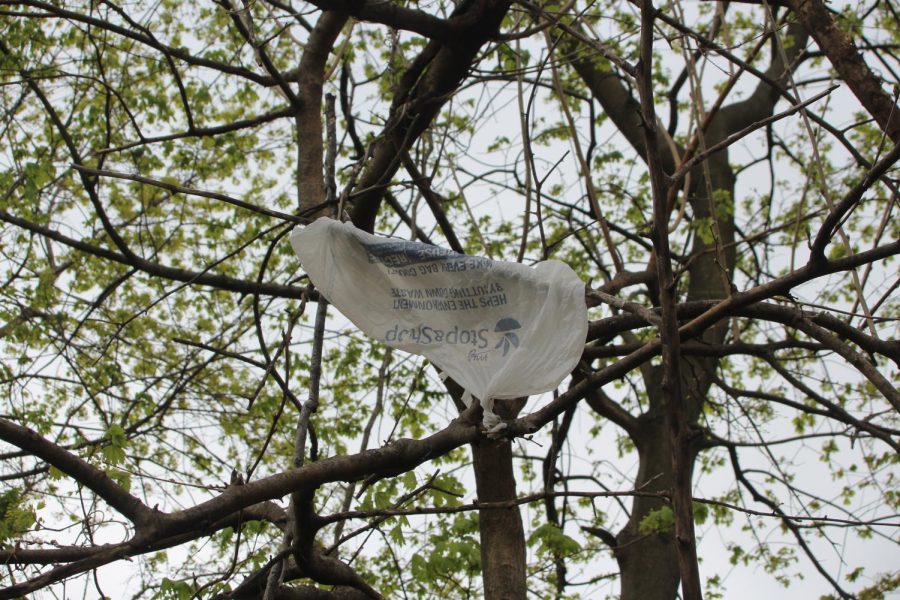New York State bag ban impact on Masters and Dobbs Ferry
A Shoprite bag is found in a tree in Westchester.
April 29, 2019
New York State legislators approved a statewide ban on single-use plastic bags which is set to take effect in early March of 2020, a sweeping move which will transform consumer life throughout Westchester County and the wider state.
According to The New York Times, New York State lawmakers’ goal was to reduce the amount of plastic wasted by New Yorkers, and the 2020 law will match those already existing in several states and scattered counties throughout the U.S.
Paper bags will be available for purchase by consumers if municipalities opt-in to a 5-cent fee, of which some funds will go to environmental protection causes and the rest will be used to provide free reusable bags to New Yorkers, according to the New York Post.
Dobbs Ferry Walgreens Shift Leader Ysi Tamo said he thinks about 10 percent of customers at the store already use reusable bags. While the Walgreens sells its own reusable bags for approximately $2, they are unpopular, according to Tamo.
Tamo said the new legislation will eventually cut company costs and “save the health of the town and the environment,” since many customers will request single-use bags for just one or two items.
Walgreens cashier Angel Delcid said that in his year working at the store, he has only sold a few of the reusable bags, which hang untouched by the checkout. At the counter, he goes through roughly a foot-thick roll of bags per day, which amounts to several hundred plastic bags. Delcid is wary of the legislation, since he uses single-use plastic bags for myriad purposes in his home, including outfitting his trash cans.
Dobbs Ferry’s Custom Crystal Creations owner Stephanie McCauley said that 50 percent of her customers bring reusable bags, but said her small business does not go through enough single-use plastic bags for the 2020 change to have a huge impact. McCauley also said that many of her customers simply request she wrap up their purchases in tissue paper, before placing them in a purse or tote.
Stop & Shop in Dobbs Ferry, which uses single-use plastic bags, declined requests by Tower to comment on the legislation.
Environmental Science teacher Courtney White is a proponent of the plastic-bag ban. She said in an interview that the plan is “superb,” and such a move is long overdue by New York State.
White said the law will serve as a helpful reminder to bring reusable bags to the grocery store. “Conservation behavior and behavior modification is not easy. We get used to our habits: it is not easy to change them. Any time there is legislation or initiatives for public awareness, or prompts and signage, they are all helpful for everybody,” White said.
Though the replacements, reusable plastic and paper bags, can have some negative environmental effects, such as the use of chemicals in manufacturing, White said it is critical to weigh the benefits and disadvantages. “There is always going to be some kind of trade-off, it’s just looking at the rate at which we are using materials and the renewable vs. renewable aspect of the product,” she said.
According to CBS News, a reusable cotton tote must be used “at least 52 times to have the same climate impact as a single-use plastic bag,” in terms of carbon footprint. However, paper and cotton totes are biodegradable, while single-use plastic does not decompose for decades.
In her capacity as advisor of EFFECT, Masters’ environmental advocacy group, White has also worked to raise awareness about single-use plastics of other varieties. One ongoing project under her supervision is the collection of single-use plastic bottles in an effort to, eventually, fashion them into a greenhouse.
White said that the collection of bottles for the greenhouse is going slowly (they need 3000, currently possessing only a few hundred), but acknowledged with a laugh that the waiting is good, because it demonstrates a low use of plastic throughout campus.
Another initiative White said she is thinking about is a possible workshop in which students could come together to fashion their own soaps, shampoos and cleaning products without toxins and then store them in reusable containers. White said such an effort would mirror the effects of comprehensive legislation in some European countries which is beginning to ban single-use plastics of multiple varieties.




